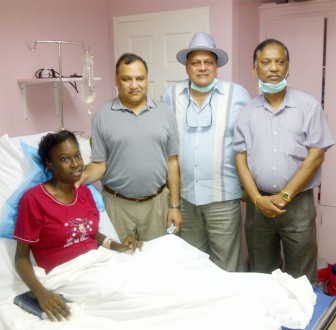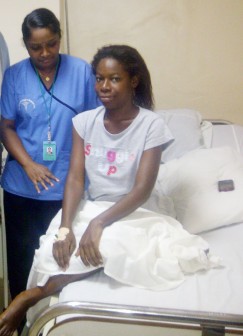Berbician Diane Williams, is now in recovery after being the 11th beneficiary of a transplant programme offered at the Balwant Singh Hospital.
Last Tuesday, Diane, 22, underwent surgery along with her sister, Paula Williams, 25, who opted to be the donor.

She never expected that she would one day have to make such a decision for herself and her younger sister, but she was left with no other choice but to take on the role. “Both our parents died and I did not want to lose my sister as well,” Paula said from her hospital bed a few days after the surgery.
While Paula was scheduled to be discharged from the hospital last Friday, Diane will remain hospitalised for about two more weeks. After the surgery, she was feeling better, and although she still experienced pain, it was gradually decreasing.
Diane had initially experienced swelling and that first prompted her to visit the New Amsterdam Hospital, where she was initially told that she had kidney stones.
The young woman, who hails from Islington, East Bank Berbice, was first admitted into the New Amsterdam Hospital in January of this year with high blood pressure. She was treated for the kidney stones but “nothing worked”, she said.
Diane said she was then taken to Balwant Singh Hospital in Georgetown, where they ran an ultrasound and found out that her kidneys were damaged; that they had shrunk.
After the diagnosis was made, and seeing how badly damaged her kidneys were, the doctor at Balwant Singh Hospital almost immediately commenced dialysis treatment, which cost $36,500 per weekly session.

According to Paula, her sister’s condition was so bad at one point during the month of August that she was placed on life support for a while. After regaining some semblance of strength, she was discharged from the hospital, but was later admitted to the Georgetown Public Hospital.
Diane needed to raise $3 million to fund her transplant surgery and an appeal was carried in this newspaper on December 3.
Stabroek News understands that Diane’s transplant was done under a programme made possible by philantrophist George Subraj, who funds a team of experts who travel to Guyana every three months.
Speaking with Stabroek News, Subraj indicated that once an individual can provide $10,000 then they can have the surgery done. He explained that diabetes and blood pressure are the causes of kidney failure and while some may be hereditary, 80% is a result of diet and lifestyle habits.
“If people were to cut out the fat, the salt, the sugar and control the diabetes and the blood pressure, they may not have a kidney failure… If they have a kidney failure or are about to have one, they can modify their diet. If you already have a kidney failure, then that is where we step in,” he said.
He pointed out that such a surgery calls for many tests, which cannot be done here. “They may have the same blood type but it also deals with tissue matching and so forth,” Subraj said as he noted that tests are sent to Washington with Dr Rahul Jindal to be done in the labs there.
Dr Jindal, the lead surgeon, along with his four-member team, initially offered their services every six months, but owing to the overwhelming response, they are now here four times a year.
Jindal, during an interview at the hospital, said that two surgeons were brought since there were two surgeries that needed to be undertaken; one with the donor and the other with the recipient. He said that along with his team, local physicians assisted and were able to look and learn. “We are hoping that maybe after 2, 3, 4 years, they will be able to do it on their own,” he stated.
Dr Jindal emphasised that the risks during surgery were minimal, while further stating that if a person suffers a kidney failure, that person requires dialysis. If the patient is not given this treatment, he said, s/he goes into a coma.
“It depends on what stage they are on in kidney failure. It comes in 5 stages and once they are in stages 4 and 5, they require dialysis,” he stated.
While in Guyana, Dr Jindal said his team completed five arteriovenous fistulas, which he explained, is a procedure that connects the artery and vein that can be used for haemodialysis.
He noted that another important aspect that was introduced is the kidney biopsies on patients who were not getting correct diagnoses. These persons’ medications will be changed and modified and they will be required to have regular check-ups with their doctors to prevent kidney failure by getting the correct diagnosis, he stated.
The team had intended to perform two surgeries but the blood work was said to have not been in place for the other patient.
Meanwhile, apart from that, Subraj said that the team saw approximately 30 other people and performed about 20 other surgeries on people who had kidney stones, urinal problems and other kidney problems.
When asked how past patients are doing, Subraj said they have all returned to work and are living life as normal except for one, Munesh Mangal, who died more than a year after his 2008 surgery.
His surgery was performed at the Georgetown Public Hospital and the doctors there were supposed to follow up with him, Subraj said.
“They committed to me verbally, and there was a press conference, that they will give him medicine for life.
Sometimes when he went, he didn’t get it, then he would go back home and come again… and if he missed the medicine…, after a little while you feel bad and when you take the medicine, you feel worse at first. So, most patients just don’t take it anymore, like Munesh Mangal. He didn’t check up with the doctors for a whole year plus and subsequently died,” he explained.
Meantime, Diane was upbeat after her surgery. “I was waiting long for this operation… the wait was worth it,” the young woman said, adding that she was looking forward to finding a good job after recovery.





